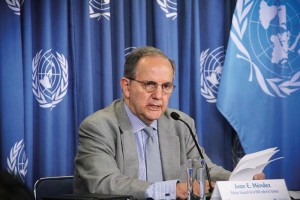UN says that torture is generalized in Mexico

Juan Méndez presented his report at the 28th session of the Human Rights Council. (Photo: ARCHIVE / EL UNIVERSAL )
Juan E. Méndez, Special Rapporteur on Torture and Other Cruel, Inhuman
or Degrading Treatment or Punishment, said that "torture is generalized in
Mexico."
In his 2014 report, Méndez said that "the National Human Rights
Commission recorded an increase in the number of complaints of torture and
ill-treatment since 2007 and reported a peak of 2,020 complaints in 2011 and
2,113 in 2012, compared with an annual average of 320 in the six years prior to
2007. Between December 2012 and July 2014, the Commission received 1,148
complaints of violations attributable to the armed forces alone."
In response to the diagnosis, Ambassador Jorge Lomónaco, Permanent
Representative of Mexico to the United Nations office and other international organizations in Geneva, said the
Mexican government disagrees with the term "generalized" because it
"does not reflect reality".
In an interview with EL UNIVERSAL, Lomónaco said that Mexico's Ministry
of Foreign Affairs requested a report to the rapporteur on the documented cases
and that it only received 14 records.
"That is why we say this term can not be sustained, because it is
limited to a few cases," Lomónaco explained.
Méndez visited Mexico from 21 April to 2 May
2014 to assess the situation of torture and ill-treatment and work with the
State to prevent and eradicate it.
In his report, Méndez said that "Mexico is facing a complex public
security situation" because "organized crime poses a challenge to the
authorities and the population."
Torture as punishment and means of investigation
He added that torture "occurs especially from the moment when a
person is detained until he or she is brought before a judge" and that it "is
used as punishment and as a means of investigation."
Quoting a survey by the Centre for Research and Teaching in Economics
(CIDE) conducted in 2012, Méndez said that "57.2% of detainees in federal
centres said that they had been beaten during their detention and 34.6% said
that they had been forced to sign or alter a confession. Consistently, an
alarming number of detainees interviewed claimed to have been tortured after
being detained. At the Federal Investigation Centre, where "arraigo"
detainees are held, almost everyone interviewed claimed to have been subjected
to torture and ill-treatment before entering the Centre."
He also said
that "people report having been detained by individuals dressed as
civilians, sometimes hooded, who drive unmarked cars, do not have an arrest
warrant and do not give the reasons for the arrest." Méndez added that
"during their arrest, people are hit, insulted and threatened. They are
blindfolded and driven to unknown locations, including military bases, where
the torture continues, consisting of a combination of: punches, kicks and
beatings with sticks; electric shocks through the application of electrical
devices such as cattle prods to their bodies, usually their genitals;
asphyxiation with plastic bags; waterboarding; forced nudity; suspension by
their limbs; threats and insults. Occasionally, days go by without anyone being
informed of the detainees whereabouts or without the detainee being brought before
the ministerial police or judicial authority."
Moreover, Méndez said that "the right of victims of torture and ill-treatment to comprehensive
redress is illusory, since there are hardly any cases in which victims have
been compensated, received medical and psychological care or benefited from
rehabilitation in accordance with international standards."
Disturbing level of impunity
He added that the "fact that the large number of complaints and testimonies received is not matched by a similar number of investigations of torture and ill-treatment, still less convictions, is evidence of a disturbing level of impunity."
In this regard, Lomónaco said that Mexico has implemented mechanisms to
eradicate torture and that protocols have been established to document and bring
cases to justice. He added that the government aims to draft a General Law
against Torture and that saying that torture is widespread in Mexico does not
reflect the great efforts made by the government "to improve the legislative
and institutional framework."





